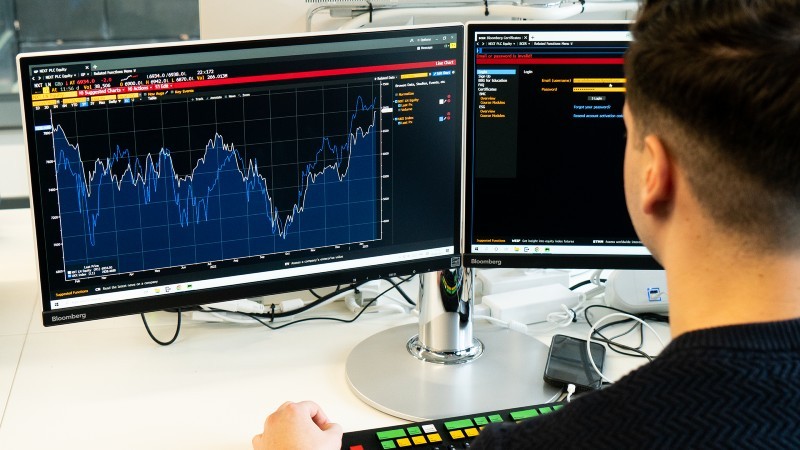Economics
BSc (Hons)
UCAS code: L100
Start dates: September 2026 / January 2027
Full time: 3 Years, or 4 if a work placement is chosen
Part time: Up to 8 years
Location: Headington
School(s): Oxford Brookes Business School
Overview
Join our Economics course and you’ll build the practical skills and key knowledge that will enable you to thrive in real world scenarios. You'll explore current events and key issues like the climate crises and other global challenges. From financial markets and sustainability to innovative entrepreneurship, you’ll learn to critique current events and challenge theoretical models and their predictive power.
You'll forge connections with a diverse network of local and global organisations and economic visionaries. Our partnerships include BMW Mini, local councils, heritage attractions like Blenheim Palace, and retail stores. During your optional placement year, you'll see how your knowledge translates across these varied contexts.
As you progress through your degree, you’ll have a variety of experiences that will help shape you into a graduate who is connected and engaged with society. You’ll also build your resilience so you can easily adapt in an age of fast paced change. You’ll graduate with a clear idea of how to stand out in a fast evolving employment market.

Why Oxford Brookes University?
-
Study the issues of our time
Sustainability, finance and innovation are woven throughout the course so you can focus on the dynamic global issues you’re passionate about.
-
Get hands on
Experience our new Bloomberg Trading Suite where you can make mock transactions on sustainable finance and ethical trading that has social and environmental benefits.
-
Question everything
Our teaching team, all active researchers, are keen to help you critique current ways of thinking and challenge the theory when it doesn’t hold up.
-
Diverse experiences
As well as a wide range of topics, your assignments will include anything from reports to quizzes, financial portfolios to data analysis.
-
Work on your career
Develop employability skills throughout the course, by exploring what you need to succeed and learning how to build an impressive CV.
-
Additional language modules
Our university-wide language programme is available to full-time undergraduate and postgraduate students on many of our courses, and can be taken as a credit on some courses.
-
Study abroad
You may be able to go on a European or international study exchange while you are at Brookes. Most exchanges take place in the second year. Although we will help as much as we can with your plans, ultimately you are responsible for organising and funding this study abroad.
Course details
Start this course in January or September
You can start this course in January if a September start doesn't suit you or is not currently offered for this course.
If you opt to start in January, in each of your 3 years, you will study your first semester between January and May and your second semester between September and December. There will be no teaching during June, July and August.
Study modules
Teaching for this course takes place Face to Face and you can expect around nine hours of contact time per week. In addition to this, you should also anticipate a workload of 1,200 hours per year. Teaching usually takes place Monday to Friday, between 9.00am and 6.00pm.
Contact hours involve activities such as lectures, seminars, practicals, assessments, and academic advising sessions. These hours differ by year of study and typically increase significantly during placements or other types of work-based learning.
Please note: As our courses are reviewed regularly as part of our quality assurance framework, the modules you can choose from may vary from those shown here. The structure of the course may also mean some modules are not available to you.
Careers
We give you lots of support throughout your degree. Part of that means talking about your career aspirations and helping you choose the right modules to build up your skills. Because of this, you’ll be an attractive prospect for many employers all over the world.
Graduates from our economics programmes are now working in roles and organisations like:
- assurance associate at PwC
- equity sales at UBS
- economist at HM Revenue & Customs
- tax manager at KPMG
- analyst at the NHS
- product analyst at Jaguar Land Rover
- fund analyst at Schroders
- financial crime analyst at Natwest
- consultant at Thomson Reuters
- analyst at BNP Paribas
- financial analyst at Rolls-Royce
- graduate project manager at UK Power Networks.
Some of our students decide to carry on their studies with a master’s or PhD at leading universities across the world.
Our Staff
Andy Kilmister
Andy teaches on a range of modules and research within the Business School and also act as an academic adviser. I am module leader for the Economics dissertation modules.
Read more about AndyDr Huan Yang
Dr Huan Yang's research focus on SME finance, international trade, global value chain, foreign direct investment and cross-boarder merger and acquisition.
Read more about HuanDr Stefanos Ioannou
Stefanos' main research interests are international macroeconomics, finance, and economic geography. Stefanos has published in a variety of peer-reviewed academic journals, including Economic Geography, Journal of Post Keynesian Economics, Urban Studies, and Review of Political Economy.
Read more about StefanosDr Yoko Nagase
My primary teaching areas are microeconomics, Environmental and natural resource economics, public finance, and mathematical economics. I have also taught multi-disciplinary modules/courses such as Environmental Studies Senior Seminar (co-taught with a team of scholars in natural sciences) and a reading course for first-year students.
Read more about YokoRelated courses
Entry requirements
Wherever possible we make our conditional offers using the UCAS Tariff. The combination of A-level grades listed here would be just one way of achieving the UCAS Tariff points for this course.
Standard offer
UCAS Tariff Points: 128
A Level: ABB
IB Points: 32
BTEC: DDM
Contextual offer
UCAS Tariff Points: 104
A Level: BCC
IB Points: 29
BTEC: DMM
Further offer details
Applications are also welcomed for consideration from applicants with European qualifications, international qualifications or recognised foundation courses. For advice on eligibility please contact Admissions: admissions@brookes.ac.uk
If you don’t achieve the required tariff points you can apply to join a foundation course, like Foundation in Business or an international foundation course to help to reach the required level for entry onto this degree.
Specific entry requirements
GCSE: Mathematics (grade 4 or above)
Please also see the University's general entry requirements.
English language requirements
Please see the University's standard English language requirements.
Pathways courses for international and EU students
If you do not meet the entry requirements for this degree, or if you would like more preparation before you start, you can take an international foundation course. Once you enrol, you will have a guaranteed pathway to this degree if you pass your foundation course with the required grades.
If you only need to meet the language requirements, you can take our pre-sessional English course. You will develop key language and study skills for academic success and you will not need to take an external language test to progress to your degree.
English requirements for visas
If you need a student visa to enter the UK you will need to meet the UK Visas and Immigration minimum language requirements as well as the University's requirements. Find out more about English language requirements.
International applications
Applications are also welcomed for consideration from applicants with international qualifications or recognised foundation courses. For advice on eligibility, please see our country pages.
If you don’t achieve the required tariff points you can apply to join a foundation course, like Foundation in Business or an international foundation course to help to reach the required level for entry onto this degree.
Credit transfer
Many of our courses consider applications for entry part-way through the course for students who have credit from previous learning or relevant professional experience.
Find out more about transferring to Brookes. If you'd like to talk through your options, please contact our Admissions team.
Terms and conditions of enrolment
When you accept our offer, you agree to the Terms and Conditions of Enrolment. You should therefore read those conditions before accepting the offer.
International qualifications and equivalences
How to apply
Application process
Full time international applicants can also apply through UCAS
Tuition fees
Questions about fees?
Contact Student Finance on:
Tuition fees
Please note, tuition fees for Home students may increase in subsequent years both for new and continuing students in line with an inflationary amount determined by government. Oxford Brookes University intends to maintain its fees for new and returning Home students at the maximum permitted level.
For further information please see our tuition fees FAQs.
Tuition fees for International students may increase in subsequent years both for new and continuing students.
The following factors will be taken into account by the University when it is setting the annual fees: inflationary measures such as the retail price indices, projected increases in University costs, changes in the level of funding received from Government sources, admissions statistics and access considerations including the availability of student support.
How and when to pay
Tuition fee instalments for the semester are due by the Monday of week 1 of each semester. Students are not liable for full fees for that semester if they leave before week 4. If the leaving date is after week 4, full fees for the semester are payable.
- For information on payment methods please see our Make a Payment page.
- For information about refunds please visit our Refund policy page
Additional costs
Please be aware that some courses will involve some additional costs that are not covered by your fees. Specific additional costs for this course are detailed below.
Optional costs
| Additional costs | Amount (£) |
|---|---|
It’s your responsibility to cover print / binding costs where coursework submission is required. Please note that a lot of the coursework is now submitted online. |
From £30 |
| You may choose to purchase books to support your studies. Many books on our reading lists are available via the Library, or can be purchased secondhand. | £20-60 per book |
Accommodation fees in Brookes Letting (most do not include bills) |
£107-301 per week |
Accommodation fees in university halls (bills included, excluding laundry costs) |
£139-248 per week |
Graduation costs include tickets, gowning and photography. Gowns are not compulsory but typically students do hire robes, starting at £41. |
Typically £0-200 |
Students are responsible for their own travel to and from university for classes. For the 2025/26 academic year, the University is introducing an alternative subsidised travel offer for all students with further information on our Travel webpages. |
From £10 |
Funding your studies
Financial support and scholarships
Featured funding opportunities available for this course.
All financial support and scholarships
Information from Discover Uni
Full-time study
Part-time study
Programme changes:
On rare occasions we may need to make changes to our course programmes after they have been
published on the website. For more information, please visit our
changes to programmes page.

